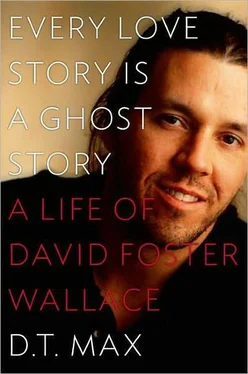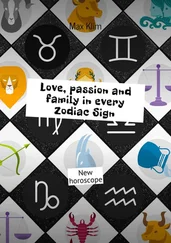D. T. Max
Every Love Story Is a Ghost Story: A Life of David Foster Wallace
For Flora and for Jules forever
What goes on inside is just too fast and huge and all interconnected for words to do more than barely sketch the outlines of at most one tiny little part of it at any given instant.
— GOOD OLD NEON, 2001
CHAPTER 1. “Call Me Dave”
Every story has a beginning and this is David Wallace’s. He was born in Ithaca, New York, on February 21, 1962. His father, James, was a graduate student in philosophy at Cornell, from a family of professionals. David’s mother, Sally Foster, came from a more rural background, with family in Maine and New Brunswick, her father a potato farmer. Her grandfather was a Baptist minister who taught her to read with the Bible. She had gotten a scholarship to a boarding school and from there gone to Mount Holyoke College to study English. She became the student body president and the first member of her family to get a bachelor’s degree.
Jim and Sally had their daughter, Amy, two years after David, by which time the family had moved to Champaign-Urbana, twin cities in central Illinois and the home of the state’s most important public university. The family had not wanted to leave Cornell — Sally and Jim loved the rolling landscape of the region — but Wallace had been offered a job in the philosophy department in the university and felt he could not turn it down. The couple were amazed when they arrived to see how bleak their new city was, how flat and bare. But soon, happily, Jim’s appointment turned into a tenure-track post, Sally went back to school to get her master’s in English literature, and the family settled in, eventually, in 1969, buying a small yellow two-story house on a one-block-long street in Urbana, near the university. Just a few blocks beyond were fields of corn and soybeans, prairie farmland extending as far as the eye could see, endless horizons.
Here, Wallace and his sister grew up alongside others like themselves, in houses where learning was highly valued. But midwestern virtues of normality, kindness, and community also dominated. Showing off was discouraged, friendliness important. The Wallace house was modest in size and looked out at other modest-sized houses. You were always near your neighbors and kids in the neighborhood lived much of their lives, a friend remembers, on their bikes, in packs. Every other kid in that era, it seemed, was named David.
There was elementary school at Yankee Ridge and then homework. The Wallaces ate at 5:45 p.m. Afterward, Jim Wallace would read stories to Amy and David. And then every night the children would get fifteen minutes each in their beds to talk to Sally about anything that was on their minds. Lights-out was at 8:30 p.m., later as the years went on. After the children were asleep, the Wallace parents would talk, catch up with each other, watch the 10 p.m. evening news, and Jim would turn the lights out at 10:30 exactly. He came home every week from the library with an armful of books. Sally especially loved novels, from John Irving to college classics she’d reread. In David’s eyes, the household was a perfect, smoothly running machine; he would later tell interviewers of his memory of his parents lying in bed, holding hands, reading Ulysses to each other.
For David, his mother was the center of the universe. She cooked his favorites, roast beef and macaroni and cheese, and baked his chocolate birthday cake and drove the children where they needed to go in her VW Bug. Later, after an accident, she replaced it with a Gremlin. She made beef bourguignonne on David’s birthday and sewed labels into his clothes (some of which Wallace would still wear in college).
No one else listened to David as his mother did. She was smart and funny, easy to confide in, and included him in her love of words. Even in later years, and in the midst of his struggle with the legacy of his childhood, he would always speak with affection of the passion for words and grammar she had given him. If there was no word for a thing, Sally Wallace would invent it: “greebles” meant little bits of lint, especially those that feet brought into bed; “twanger” was the word for something whose name you didn’t know or couldn’t remember. She loved the word “fantods,” meaning a feeling of deep fear or repulsion, and talked of “the howling fantods,” this fear intensified. These words, like much of his childhood, would wind up in Wallace’s work.
To outside eyes, Sally’s enthusiasm for correct usage might seem extreme. When someone made a grammatical mistake at the Wallace dinner table, she would cough into her napkin repeatedly until the speaker saw the error. She protested to supermarkets whenever she saw the sign “Ten items or less” posted above their express checkout lines. (Wallace would later give this campaign in Infinite Jest to the predatory mother figure of Avril Incandenza, cofounder of “Militant Grammarians of Massachusetts.”) For Sally, grammar was more than just a tool. It gave membership in the club of educated persons. The intimation that so much was at stake in each utterance thrilled David, and added to the excitement of having a gifted mother. As did her sensitivity — Sally hated to shout. If she was upset by something she would write a note. And if David or Amy had a response, they would slip it back under her door in turn. Even as a little boy, Wallace was attuned to the delicate drama of personality. He wrote when he was around five years old — and one hears in the words the sigh of the woman who prompted it:
My mother works so hard
And for bread she needs some lard.
She bakes the bread. And makes the bed.
And when she’s threw
She feels she’s dayd.
The boy loved his father too, an affectionate if slightly abstracted figure, the firm, gentle man who read to him every night at the dinner table. “My father’s got a beautiful reading voice,” Wallace told an interviewer when he was in his mid-thirties,
and I remember me being five and Amy being three, and Dad reading Moby Dick to us — the unexpurgated Moby Dick . Before — I think halfway through Mom pulled him aside and explained to him that, um, little kids were not apt to find, you know, cetology, all that interesting. Um, so they were — but I think by the end, Amy was exempted. And I did it just as this kind of “Dad I love you, I’m gonna sit here and listen.”
The memory is exaggerated — Wallace’s father says he knew enough not to read Moby-Dick , certainly not its duller parts, to small children — but it captures well the relationships in the family as David saw them: the kind, somewhat otherworldly father, the noncombatant younger sister, and David in the center, at once shielded by his mother and trying to break free of her dominion.
Wallace’s childhood was happy and ordinary. He would emphasize this in later years. He was a skinny, gap-toothed kid with flaccid hair cut in bangs. He liked the Chicago Bears, loved their star linebacker Dick Butkus (he would make “a great sergeant in the war of Vietnam,” he wrote in a school assignment), and wanted to be a football player too, or a brain surgeon, to help his mother’s nerves. He thought of himself as normal — and was normal. But he was also identifiably from a talented family, one in love, not unlike Salinger’s Glass family, with the ability to impose their notional world on the real one. “Behave,” his mother once told him when he was three. “I am ‘have,’” David responded. On a car trip when he was eight or nine, the family agreed to substitute “3.14159” for every mention of the word “pie” in their conversation. Wallace was verbal but he was not particularly literary; in fact he saw himself as at least as good at logic and puzzles. One childhood friend remembers going to a book signing of Wallace’s and being amazed when his friend could still throw out a twenty-five-digit number they’d all memorized together as kids.
Читать дальше












